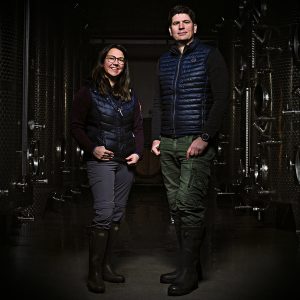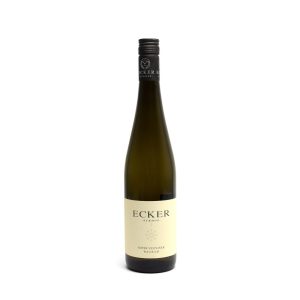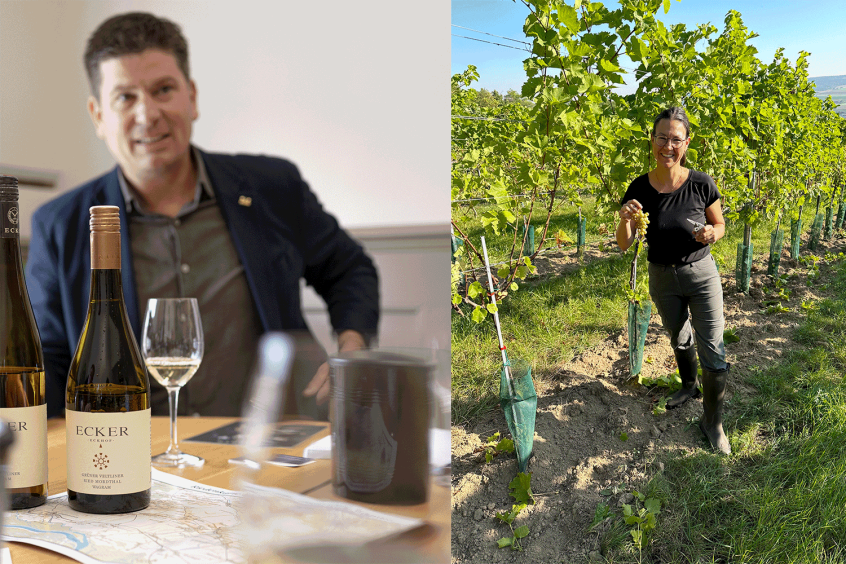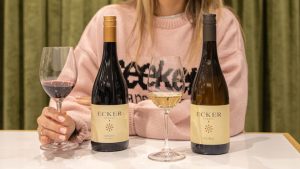For over 400 years, the Ecker family has been crafting wine in the heart of Wagram, Austria—an enduring legacy now carried forward by Bernhard and his wife, Alexandra Ecker. As the latest generation to take the helm, they combine centuries of tradition with a modern touch, continuing to elevate the family’s reputation for quality and authenticity.
The estate, named Ecker-Eckhof, reflects both heritage and place: “Ecker” from the family name, and “Eckhof” referencing the crossroads where the winery is located. This symbolism underscores the family’s deep connection to tradition and terroir—principles that guide every bottle they produce.
Spanning 31 hectares of prime Austrian terroir, the domaine is dedicated to many native varieties such as Gruner Veltliner, Riesling, and their true passion: the distinctive and rare Roter Veltliner.
We were delighted to sit down with Bernhard and Alexandra Ecker to explore the story behind the estate, their views on the evolution of Austrian wine, and their vision for the future of this historic winery.
Q: Can you give our readers a quick introduction to your estate, what you stand for and a bit about the wines you produce?
We are a family-run winery located in the idyllic village of Mitterstockstall. The estate is run by myself, Bernhard Ecker and my wife Alexandra, who continue in the spirit of my parents, Johann and Marianne, with the aim of producing honest, characterful wines.
Our loyalty to tradition is also reflected in the company’s logo. Johann Ecker, my grandfather, was one of Stockstall’s last “wine keepers” – a traditional vineyard manager, also known as “Hiata” in Eastern Austria, who guarded the grapes and the corridors between the vines. The Hiata’s icon was the so-called “guardian star”, and this “Hiata star” is now an integral part of the Ecker logo.
We are a third-generation winery, growing grapes and producing wine since 1580. From 1848, following the peasants’ liberation, until 1950, the family’s small farm was located in Unterstockstall. In 1950, Bernhard’s grandfather Johann Ecker, born in 1920, moved the business from Unterstockstall to Mitterstockstall, the current location. I was born in 1977, and my parents, Johann and Marianne, took over the farm in 1980 and slowly converted it to a pure wine-growing farm.
In 1998, I took over winemaking responsibilities, and in 2002 received my first high honour by winning two awards in the Grüner Veltliner category at a state-wide competition. Since 2024 Moritz my eldest son, is also part of the winery. The foundations for the next generation have been laid.
Q: What are your earliest memories of working as part of the estate? Did you always know you wanted to be involved in wine production?
As the son of a winemaking family, winemaking was practically in my blood… I took over the business at a young age and produced my first vintage in 1996. My love of wine is not only my passion, but I also share this passion with my wife Alexandra. Our shared goal is to produce honest, clear, straight wines in which you can taste the origin and terroir.
Q: Can you tell us a bit about what your day-to-day looks like now at Ecker?
There’s actually no exact daily routine, as every day is different and it’s difficult to plan. We’re dependent on the weather, and the biggest challenge in the vineyards is, especially in spring, reacting quickly. But generally speaking, I can say that I, along with my staff, take care of the vineyards. My eldest son, my wife, and I manage the cellar. My wife also takes care of all the office work, exports, the website, newsletter, etc. We also place great importance on our farm sales and have a wine tavern, Heurigen.
Q: What is the biggest obstacle you have to overcome in producing wine?
The weather and bureaucracy are the biggest obstacles we have to accept. And of course, the sales, which aren’t getting easier…
Q: What part of the winemaking process do you enjoy the most?
Counting the money, haha – no, just kidding. Accompanying the vines the whole vegetation (pruning, flowering, and harvest), the creation of a new vintage and tasting the new wines every year.
Q: You call your Roter Veltliner the ‘White Wine Diva’, what made you call it this, and what made you decide to cultivate this variety?
Roter Veltliner plays an extremely important role at Ecker as a specialty from the Wagram. This autochthonous grape variety owes its name to the reddish skin of its grapes – “Roter Veltliner” translates to “Red Veltliner”. However, despite its reddish skin, Roter Veltliner it is a true white wine variety, as the grape skin does not contain any anthocyanins (red pigments) and therefore does not impart any color to the wine even after long maceration.
For many years, Roter Veltliner was the most popular and most widely grown variety in the Wagram, until Grüner Veltliner prevailed. (Interestingly, the two varieties are not related.)
Depending on the vintage, it is lean and fruity or full and lush, from light-footed and easy-drinking wine to multi-faceted reserve; almost anything is possible with Roter Veltliner. Fully ripe Roter Veltliner, especially from warm and hot years, shows great storage potential. Its range of flavour is broad and, in contrast to Grüner Veltliner, which almost always has pear or apple notes, Roter Veltliner shows aromas ranging from apple to more exotic notes – nearly everything the fruit basket has to offer.
As diverse and flexible as Roter Veltliner is in the glass, it is equally capricious and diva-like as it grows. Even when it comes to location, it is extremely picky. The Roter Veltliner loves warm, airy, south-exposed locations, and it feels very much at home at our Steinberg vineyard. Though it is very tolerant of heat and drought, its high susceptibility to frost and fungus, coupled with a late ripening point, is a great challenge for us as winemakers. In addition, the foliage work is enormously complex, as the grape clusters are very compact and a good leaf to fruit ratio is essential to healthy grapes. But once she, our diva, has been harvested, fermented, matured, bottled and at a pleasant temperature poured in our glasses, all the arduous work is forgotten and only one thing comes to mind: This is what Wagram tastes like.
Q: For UK consumers just getting into Austrian wine, which of your wines would you suggest they start with?
Our Grüner Vetliner – an easy drinking, typical Grüner from Lower Austria. And then maybe our Roter Veltliner Wagram – very typical for us and our region Wagram, where we come from.
Q: How do you see the future of Ecker Eckhof?
I’m generally a pessimist, so future is pretty bad, haha. My wife is an optimist, so for her everything is always fine. It’ll probably be somewhere in between. I don’t think selling wine will necessarily getting easier, but I’m convinced that there are only a few Austrian winemakers with such consistently top quality. So, we’re optimistic, our numbers are good.
At Nickolls & Perks, we’ve long admired the wines of Ecker-Eckhof and are proud to have fostered a close relationship with the family over the years. Their wines consistently capture the character and charm of Austrian terroir—ranging from richly textured expressions to crisp, refreshing styles, along with some wonderfully distinctive blends and varietals.
We hope this interview has offered you a deeper appreciation of the Ecker family’s dedication and craft. If you haven’t yet explored their wines, we highly encourage you to discover the elegance and authenticity that make Ecker-Eckhof a standout in Austrian winemaking.


